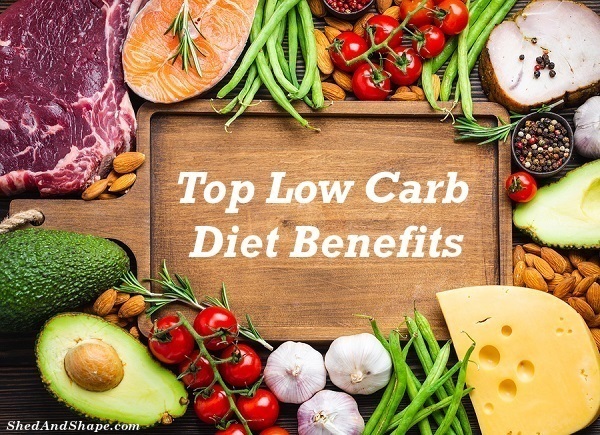The low carb diet benefits are immense, which is why more and more people are now ditching their carbs.
Carbohydrates might be your body’s main source of energy, but consuming it in high amounts could lead to various illnesses.
Processed carbohydrates like bread, white rice, and sugar don’t provide your body with optimal nutrition. These foods go through a process that remove their vital nutrients, such as dietary fiber and minerals.
One of the most popular low carb diet benefits is weight loss. But aside from losing weight, a low carb diet comes with several other benefits too. Here are 4 of the top benefits of a low carb diet.
Related reading: 5 Top Tips for Getting Started on a Low Carb Diet
Low Carb Diet Benefits
1. Lower Blood Pressure
Hypertension or elevated blood pressure is a significant risk factor for various illnesses, including kidney failure, heart disease, and stroke. Unfortunately, a lot of people who have a raised blood pressure are not aware that they have it.
Others are also not getting proper treatment for it. According to the NHS, about 13% of women and 18% of men have high blood pressure but are not receiving proper treatment.
Studies show that a low carb diet may help to lower blood pressure and minimize your risk of suffering from various illnesses. In fact, BBC News has reported that,
“A low-carbohydrate diet like Atkins is better at cutting blood pressure than weight-loss pills.”
According to the news, a study found that twice as many people who were put on a low carb diet lowered their blood pressure compared to those who were taking Orlistat, a popular weight loss drug.
2. Controls Blood Sugar Level
Diabetes is a chronic disease that affects more than 400 million people around the world. Although it’s a pretty complicated disease to treat, maintaining a healthy level of blood sugar can greatly reduce the risk of symptoms and complications.
People who are suffering from diabetes can greatly benefit from a low-carb diet. If you have diabetes, your body won’t be able to effectively process carbs.
When you eat carbs, they will be broken down to small units of glucose that eventually end up in your blood which is often referred to as blood sugar. Lowering your carbohydrate consumption can clearly help lower your blood sugar to a healthy level.
Related reading: 6 Damaging Effects Of Sugar On Your Body
In addition, a recent study done by a group of researchers from Ohio State University and was published in Science Daily has found that “the low carb diet can be beneficial for people who are at risk of developing type 2 diabetes even if they will not lose any weight.”
According to Jeff Volek, the senior author of the study,
“There’s no doubt that people with metabolic syndrome and type 2 diabetes do better on low-carb diets.”
The researchers believe that restricting carbs even without the goal of losing weight can treat a number of metabolic problems in the body, including diabetes.
3. Weight Loss
One of the top low carb diet benefits is of course weight loss. Most people who follow a low carb diet aim to lose weight and were able to successfully shed off their excess pounds.
Related reading: How Many Carbs Do You Need To Eat To Lose Weight?
There are many reasons why you could lose weight with a low carb diet. First of all, it’s effective at reducing your appetite. Studies show that people who cut their carbs end up eating fewer calories, which results in weight loss.
Related reading: How A Low Carb Diet Keeps Your Appetite Under Control
Cutting carbs may not be the only reason behind weight loss on a low carb diet, especially if you follow the ketogenic diet. According to some studies, you could end up successfully losing weight on a keto diet due to the extra protein and fat, which helps to keep you feeling full longer.
Related reading: Best Carbs to Eat for Weight Loss
Secondly, people who follow a low carb, high-fat diet like keto could lose more weight faster than a low-fat diets. It’s because low-carb diets act to get rid of excess water from your body, which lowers insulin levels leading to rapid weight loss during the first few weeks of the diet.
In fact, one study compares low carb to low-fat diets. The result shows that those who restricted their carbs lost 2 to 3 times as much weight without feeling hungry.
4. Cardiovascular Benefits
One of the lesser-known low carb diet benefits is its ability to lower the risk of heart ailments. When you follow a low carb diet, your triglycerides could drop drastically. These are fat molecules that circulate in your bloodstream. It’s a known fact that a high level of triglycerides could put a person at risk of heart diseases.
One of the main reasons behind the increasing level of triglycerides is high carb consumption. So, if you cut down your consumption of carbs, you could experience a significant reduction of triglycerides. As a result, your risk of developing heart diseases and stroke will be reduced.
Also, a diet that’s low in carbs could increase the level of good cholesterol (HDL) in your body. If you have a high level of HDL compared to LDL, which is often called “bad cholesterol”, you could lower your risk of developing heart diseases.
Related reading: How a Low Carb High Fat Diet Affects your Cholesterol
One way to increase your HDL is to eat fats, which is what a low carb, high-fat diet like keto would require.
Related reading: Doesn’t A High Fat Diet Clog Up Your Arteries?
Conclusion
As you can see low carb diet benefits are very impressive. Aside from helping to improve your blood pressure and blood sugar level, it also helps to reduce your appetite, which leads to successful weight loss. Above all, it helps to lower your triglycerides, which minimizes your risk of heart diseases.
However, in order for you to take full advantage of these low carb diet benefits, you need to first understand what the diet is and how much carbs you’re only allowed to consume.
To get started, ensure that your daily carb consumption is less than 100 g net carbs. Eventually, you can lower it to 50 g net carbs. If you aim to follow the ketogenic lifestyle, your daily carb consumption should be less than 20 g net carbs per day. The rest of your calories should come from fats and protein. Read this article to understand how the keto diet works.
While some people find it easier to follow a low carb, high-fat diet like keto, others might find the diet very restrictive. The key is in understanding what your body needs and following what you believe is more convenient for you in the long run.










